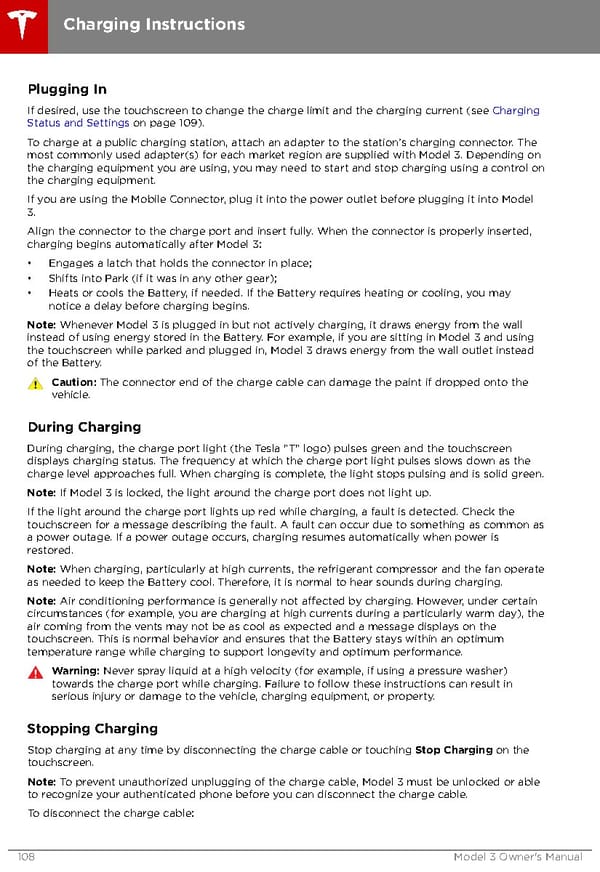Charging Instructions Plugging In If desired, use the touchscreen to change the charge limit and the charging current (see Charging Status and Settings on page 109). To charge at a public charging station, attach an adapter to the station†s charging connector. The most commonly used adapter(s) for each market region are supplied with Model 3. Depending on the charging equipment you are using, you may need to start and stop charging using a control on the charging equipment. If you are using the Mobile Connector, plug it into the power outlet before plugging it into Model 3. Align the connector to the charge port and insert fully. When the connector is properly inserted, charging begins automatically after Model 3: • Engages a latch that holds the connector in place; • Shifts into Park (if it was in any other gear); • Heats or cools the Battery, if needed. If the Battery requires heating or cooling, you may notice a delay before charging begins. Note: Whenever Model 3 is plugged in but not actively charging, it draws energy from the wall instead of using energy stored in the Battery. For example, if you are sitting in Model 3 and using the touchscreen while parked and plugged in, Model 3 draws energy from the wall outlet instead of the Battery. Caution: The connector end of the charge cable can damage the paint if dropped onto the vehicle. During Charging During charging, the charge port light (the Tesla "T" logo) pulses green and the touchscreen displays charging status. The frequency at which the charge port light pulses slows down as the charge level approaches full. When charging is complete, the light stops pulsing and is solid green. Note: If Model 3 is locked, the light around the charge port does not light up. If the light around the charge port lights up red while charging, a fault is detected. Check the touchscreen for a message describing the fault. A fault can occur due to something as common as a power outage. If a power outage occurs, charging resumes automatically when power is restored. Note: When charging, particularly at high currents, the refrigerant compressor and the fan operate as needed to keep the Battery cool. Therefore, it is normal to hear sounds during charging. Note: Air conditioning performance is generally not affected by charging. However, under certain circumstances (for example, you are charging at high currents during a particularly warm day), the air coming from the vents may not be as cool as expected and a message displays on the touchscreen. This is normal behavior and ensures that the Battery stays within an optimum temperature range while charging to support longevity and optimum performance. Warning: Never spray liquid at a high velocity (for example, if using a pressure washer) towards the charge port while charging. Failure to follow these instructions can result in serious injury or damage to the vehicle, charging equipment, or property. Stopping Charging Stop charging at any time by disconnecting the charge cable or touching Stop Charging on the touchscreen. Note: To prevent unauthorized unplugging of the charge cable, Model 3 must be unlocked or able to recognize your authenticated phone before you can disconnect the charge cable. To disconnect the charge cable: 108 Model 3 Owner's Manual
 Tesla Model 3 | Owner's Manual Page 107 Page 109
Tesla Model 3 | Owner's Manual Page 107 Page 109